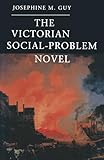The Victorian social-problem novel : the market, the individual, and communal life / by Josephine M. Guy
Material type: TextLanguage: English Publication details: London: Macmillan Press, 1996. Description: x, 238p.; 23 cmISBN: 0333628446DDC classification: 823.809355 Summary: The critical history of Victorian social-problem novels maps many of the changes in the theory and practice of literary history in the second half of the twentieth century. Josephine M. Guy's account of various critical responses to these enduringly popular works examines a range of approaches, particulary those of historicist, new-historicist and Marxist critics. Her own critical account of the sub-genre is built around close readings of such core texts as Hard Times, Mary Barton, North and South, Sybil, Alton Locke and Felix Holt. By focusing on the intellectual context in which these novels were produced - on the Victorians' debates about 'the social'and their understanding of what is meant by a 'social problem' - she recharacterises an important moment in mid-nineteenth-century literary history
TextLanguage: English Publication details: London: Macmillan Press, 1996. Description: x, 238p.; 23 cmISBN: 0333628446DDC classification: 823.809355 Summary: The critical history of Victorian social-problem novels maps many of the changes in the theory and practice of literary history in the second half of the twentieth century. Josephine M. Guy's account of various critical responses to these enduringly popular works examines a range of approaches, particulary those of historicist, new-historicist and Marxist critics. Her own critical account of the sub-genre is built around close readings of such core texts as Hard Times, Mary Barton, North and South, Sybil, Alton Locke and Felix Holt. By focusing on the intellectual context in which these novels were produced - on the Victorians' debates about 'the social'and their understanding of what is meant by a 'social problem' - she recharacterises an important moment in mid-nineteenth-century literary history
| Item type | Current library | Call number | Status | Date due | Barcode |
|---|---|---|---|---|---|
 Books
Books
|
PROF. BHUBANESWAR BEHERA CENTRAL LIBRARY General Stacks | 823.809355 GUY/T (Browse shelf(Opens below)) | Available | 95102 |
The critical history of Victorian social-problem novels maps many of the changes in the theory and practice of literary history in the second half of the twentieth century. Josephine M. Guy's account of various critical responses to these enduringly popular works examines a range of approaches, particulary those of historicist, new-historicist and Marxist critics. Her own critical account of the sub-genre is built around close readings of such core texts as Hard Times, Mary Barton, North and South, Sybil, Alton Locke and Felix Holt. By focusing on the intellectual context in which these novels were produced - on the Victorians' debates about 'the social'and their understanding of what is meant by a 'social problem' - she recharacterises an important moment in mid-nineteenth-century literary history


















There are no comments on this title.